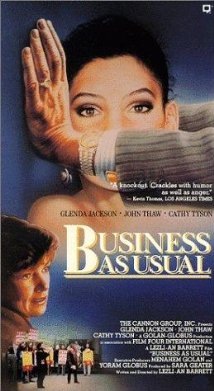
BUSINESS AS USUAL
UK, 1988, 88 minutes, Colour.
Glenda Jackson, John Thaw, Cathy Tyson, Mark Mc Gann, Eamonn Boland, Steve Mc Gann, Stephen Dillane.
Directed by Lezli An Barrett.
This is a small-budget film written and directed by Leslie Ann Barrett, her only film.
The film has social concern, the kind of story told by such social-mind directors as Ken Loach. It was released in 1988 and reflects Britain in the 1980s, especially with Margaret Thatcher as Prime Minister, her stances against the unions, the various strikes and protests.
The setting is Liverpool, a shop changing hands in ownership, issues of sexual harassment with the floor manager, harassed women afraid to speak out because they might lose their jobs. But, one of the workers does speak out, is sacked, and begins a journey of growing awareness about work situations, the unions, strikes and protests, possibilities for change.
She is played by Glenda Jackson, beginning as a rather timid person on the floor of the shop, standing up for the harassed woman, played by Cicely Tyson, and gradually coming into her own. This is especially interesting in hindsight with Glenda Jackson entering Parliament in the early 1990s and being there for many years.
John Thaw plays her husband who had been injured in the workplace but does not stand up for rights. Two of their sons, the McGann? brothers, are union activists.
The film has the earthiness of workers’ lives in Liverpool as well as the energy of those who participate in protests.
1. Social drama? Message drama? Topical, Britain in the 1980s?
2. Small budget films, the city of Liverpool, details of the city? London, shops and offices?
3. The mood of the 1980s, Liverpool, the shop, the takeover, changes? The song – What’s Love…?
4. The title, the ironies, past practice, the present, strikes and protest, change?
5. Thatcher’s Britain, the links with Europe? The unions, action, administration, closures, unemployment, different businesses, glamour business, ordinary? Harassment of staff? Deals, protests? The police and the administration of the law?
6. Sexual harassment and issues? The film’s female point of view, writer and director, the cast? Glenda Jackson and her political career after this? The opening, the photos, the shop? The unions, the bosses? Babs and her being a symbol of the workers? The police, Paula? Joan and the media? Babs and her speech? The issue, Josie, the harassment, her place in the shop, not wanting to speak out, not wanting to lose her job? Dramatised, straightforward, simplistic, credible? Josie’s role? Dunlop, the firm, the changes? The secretary, the models, Barry and his work, praise? The difficulties, negotiations? Tough, the lawyer? Barry in the spa? The toilet discussion? Capitulation and the reasons? Barry and his harassment of Josie?
7. The Flynns, the family, the older generation, Kieran, his work, disabled, at home? Babs? The boys? The redundancies, television interviews, the relationship with Joan, Bab’s support or not? The fights, pride, the sons and their support?
8. Glenda Jackson as Babs, in herself, family, the children, the shop and the girls, Barry and the making of the coffee, Josie, the reprimand, the sack, at home, her relationship with Kieran, Stephen and his help, Paula? The arrest, the union? Lewis, Mark Gittings, the protest, the sign and involvement? Babs and her transformation from a quiet person to an activist?
9. The contrast between husband and wife, his passivity, her growing action? The strike, her involvement, activities, a voice?
10. Her sons, their union background, activism, support of their mother?
11. A semi-documentary touch? The relevance of the film in the 1980s? In subsequent decades? The change in Britain?